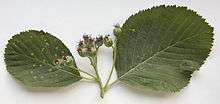Sorbus eminens
| Sorbus eminens | |
|---|---|
 | |
| Leaves and unripe fruit from a small tree in Sutton Park, England | |
| Scientific classification | |
| Kingdom: | Plantae |
| (unranked): | Angiosperms |
| (unranked): | Eudicots |
| (unranked): | Rosids |
| Order: | Rosales |
| Family: | Rosaceae |
| Genus: | Sorbus |
| Subgenus: | Sorbus subg. Aria |
| Species: | S. eminens |
| Binomial name | |
| Sorbus eminens E.F.Warb. | |
Sorbus eminens, the round-leaved whitebeam,[1] sometimes classified as Aria eminens when the Aria subgenus of Sorbus is elevated to full genus,[2] is a species of plant in the Rosaceae family. It is endemic to the United Kingdom. It is threatened by habitat loss.
Description
As part of the Sorbus aria complex, Sorbus eminens is broadly similar to S. aria. It is a shrub or small tree up to 10 m (33 ft) tall. The undersides of the leaves are greyish-white due to the many hairs. The leaves are more or less round, usually with a length 1–1.3 times the width, rarely up to 1.5 times as long as wide; they usually have 9–11 veins on either side. The leaf margins usually have a single series of teeth ("uniserrate") although there can be evidence of a second series ("biserrate"). The fruits have many lenticels, small and large, mainly towards the base.[3]
Distribution and habitat
Sorbus eminens is endemic to parts of south-west England and south Wales. It is considered to be native to calciferous woodland in north Somerset, west Gloucestershire, Herefordshire and Monmouthshire.[3] It has also been recorded in Sutton Park, Birmingham, well outside its expected range, where it is assumed to have been planted originally.[4]
References
- ↑ "BSBI List 2007". Botanical Society of Britain and Ireland. Archived from the original (xls) on 2015-02-25. Retrieved 2014-10-17.
- ↑ "NBN Taxonomic and Designation Information: Sorbus eminens". National Biodiversity Network. Joint Nature Conservation Committee. Retrieved 29 June 2012.
- 1 2 Stace, Clive (2010). New Flora of the British Isles (3rd ed.). Cambridge, UK: Cambridge University Press. ISBN 978-0-521-70772-5. p. 209.
- ↑ Trueman, Ian; Poulton, Mike; Reade, Paul (2013). Flora of Birmingham and the Black Country. Newbury, Berks: Pisces Publications. ISBN 978-1-874357-55-1. p. 271.
Source
- Wigginton, M. J. 1998. Sorbus eminens. 2006 IUCN Red List of Threatened Species. Downloaded on 23 August 2007.
